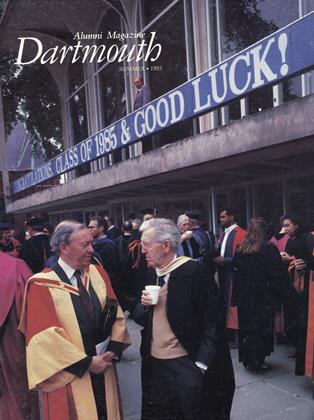The sixties' term "rap," meaning to engage in frank dialogue, was taken out of mothballs at the end of April. There was a lot of earnest discussion going on on campus, culminating in two major meetings. On April 25, several Trustees met with an ad hoc student group, and on April 29, a special facultymeeting was held.
Dean Edward Shanahan chaired the April 25 meeting, a panel discussion between nine students calling themselves the Ad Hoc Committee on Governance and Administrative Policy (GAP) and seven of the College's 16 Trustees (Walter Burke '44, Robert Douglass '53, Robert Field '43, Priscilla Frechette, Ann Fritz-Hackett '76, Norman McCulloch '50, and Ronald Schram '64).
The racial and economic diversity of the student body was one item on GAP's agenda. Schram said it is an item high on the Trustees' agenda as well, noting that where the College has targeted its recruitment efforts — blacks and Native Americans — it has the highest percentages of any of the Ivies.
Also mentioned by GAP were apparent inconsisten- inconsistencies in College policies. ROTC's ban on homosexuals seems to contradict the College's statement of non-discrimination on the basis of sexual preference, students said. Field called this "an inconsistency [he's] willing to accept," and Burke said he sees "a greater good" in ROTC's presence on campus. Another inconsistency cited was The Dartmouth Review's use of the College name, despite a contrary policy. While the College's response to this matter may "seem to be inaction," said Burke, "it's not for lack of thinking about it. "
Divestiture also came in for discussion. Later during their Hanover sojourn, the Trustees approved divestment of two companies not in compliance with the College's policy on South African investments, but students expressed the hope that the College would move toward full divestment.
Administrative budget priorities was another item brought up. The amount of money being allocated for renovation and construction projects concerned students; one noted that "intellectual capital is far more essential than building capital." Burke noted, however, that many of the projects underway currently were "long overdue."
The meeting, attended by about 75 students, administrators, and faculty members, concluded with expressions of mutual good will and hopes that such exchanges could occur again.
The second major "rap" was held on April 29. Faculty members had called a special meeting to discuss the governance of the College. President McLaughlin led off the meeting with a prepared statement in which he outlined what he saw as achievements of his administration overhaul of the"D Plan," avoidance of an admit-deny financial aid policy, increased faculty sabbaticals, some major renovation and construction projects, and good performance in development. He went on to admit that perhaps he had "not taken the time" to communicate enough with faculty on such matters. He said that while "I cannot and will not abdicate the responsibility I have [to make final decisions], clearly I have an obligation to be a better communicator with you."
The faculty and observer sections both were filled to overflowing for the meeting, with some 300 in attendance in all. A number of faculty members, including Charles Wood (history), Fred Berthold (religion), Charles McLane '41 (government), Richard Joseph '65 (government and Afro-American studies), Thomas Roos (biology), and Roger Masters (government) spoke to the meeting. The concerns expressed by faculty included a tendency towards operation of the College on a corporate rather than an academic model during McLaughlin's tenure; a trend away from faculty input into curricular decisions; and differing priorities between the faculty and the administration. Ber- thold expressed concern that the faculty's negative vote on ROTC was "overturned by fiat, by which I mean without dialogue." Masters won- dered whether faculty were merely to be considered "paid employees" of the College. And Roos noted the seriousness of the faculty's concerns, saying that they were not being Jeremiahs.
At the end of the two and a half-hour meeting, the faculty voted 167-2 in favor of a motion setting up an ad hoc faculty committee on governance to study the issue and to work with the Trustees on the matter. The committee will report back to the faculty by December.
James P. Breeden '56, left, is congratulated, by well-wishersafter a Rollins Chapel service installing him as the fourth deanof the Tucker Foundation. The ceremony concluded withbrightly-costumed clowns distributing balloons to the congregation "to remind us that we are after all," as Breeden noted,"the clowns of God."
The development of intellectual competence is by all odds "the first among equals" in the concerns of a college. . . It is the one thing a college is best suited to do, the thing it ought to do best and certainly must do well if it is to be a good college in any respect. —John Sloan Dickey in the foreword to TheCollege on the Hill
 View Full Issue
View Full Issue
More From This Issue
-
 Feature
FeatureA Humanist Ponders the Future of Liberal Education
June 1985 By Charles T. Wood -
 Feature
FeatureAn Apple on Every Desk
June 1985 By Fred Pfaff '85 -
 Feature
FeatureThe Great Train Robbery
June 1985 By Fred Pfaff '85 -
 Feature
FeatureThe Wentworth Bowl
June 1985 By Barbara J. MacAdam, Curator, Hood Museum of Art -
 Cover Story
Cover StoryValedictory Address
June 1985 -
 Feature
FeatureReunions 1985
June 1985 By Robert Frost








